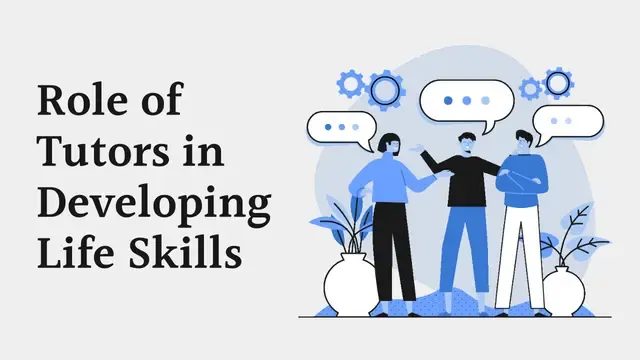
Beyond Academics The Role of Tutors in Developing Life Skills
When we think of tutoring, we often associate it with academic support and improving grades. When we think of tutoring, we often associate it with academic support and improving grades.
However, tutors can play a significant role in fostering more than just academic excellence. They have the unique opportunity to help students develop essential life skills that go beyond the classroom. In this blog post, we will explore how tutors can contribute to the holistic development of students by nurturing important life skills that prepare them for success in various aspects of their lives.
1. Effective Communication:
Communication skills are vital in all aspects of life, from personal relationships to professional endeavors. Tutors can provide guidance on expressing ideas clearly, active listening, and articulating thoughts effectively. By engaging in discussions, providing constructive feedback, and modeling effective communication, tutors help students develop the skills needed to express themselves confidently and build strong relationships with others.
2. Time Management and Organization:
Time management and organizational skills are crucial for success in academics and beyond. Tutors can teach students how to prioritize tasks, create schedules, and manage their time effectively. By setting realistic goals and deadlines, tutors instill a sense of discipline and help students develop strategies to balance their academic workload, extracurricular activities, and personal responsibilities.
3. Problem-Solving and Critical Thinking:
Life is full of challenges that require problem-solving and critical-thinking skills. Tutors can present students with complex problems, encourage them to analyze situations from different perspectives and guide them in developing logical and creative solutions. Through discussions, interactive activities, and real-world examples, tutors foster a problem-solving mindset that empowers students to tackle challenges with confidence and think critically about the world around them.
4. Resilience and Perseverance:
Building resilience and perseverance is essential in overcoming obstacles and setbacks. Tutors can help students develop a growth mindset by encouraging them to embrace challenges, view failures as opportunities for growth, and persist in the face of adversity. By providing encouragement, support, and strategies to overcome obstacles, tutors teach students the importance of resilience and perseverance in achieving their goals.
5. Self-Confidence and Self-Efficacy:
Tutors can play a significant role in boosting students' self-confidence and self-efficacy. By recognizing and praising their achievements, providing constructive feedback, and fostering a supportive learning environment, tutors help students develop a positive self-image. This confidence extends beyond academics, empowering students to believe in their abilities and take on new challenges in all areas of life.
6. Collaboration and Teamwork:
The ability to work collaboratively and effectively as part of a team is essential in many professional settings. Tutors can create opportunities for students to engage in group projects, discussions, and collaborative activities. By promoting active participation, fostering effective communication, and teaching the value of teamwork, tutors equip students with the skills necessary to collaborate successfully with others.
7. Adaptability and Flexibility:
In an ever-changing world, adaptability and flexibility are vital skills. Tutors can expose students to new ideas, diverse perspectives, and different learning strategies. By encouraging open-mindedness, embracing change, and providing a supportive environment for exploration, tutors help students become adaptable individuals who are comfortable with uncertainty and open to lifelong learning.
Conclusion:
While tutors are known for their academic expertise, their impact extends far beyond subject matter knowledge. By nurturing important life skills, tutors contribute to the holistic development of students, preparing them for success in various areas of their lives. Through effective communication, time management, problem-solving, resilience, self-confidence, collaboration, and adaptability, tutors empower students to navigate challenges, seize opportunities, and become well-rounded individuals who are equipped to thrive in today's dynamic world. The role of tutors in developing life skills goes beyond academic achievement, shaping the future success and well-being of the students they serve.
Last update: 2023-07-17 02:03:29
 Clenta
Clenta











